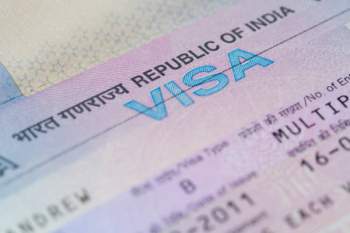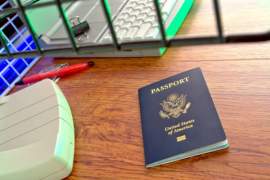
Handy Information on Foreign Visas

Related Forms
I-129 H1B Petition for a Nonimmigrant Worker
Form I-130 Petition for Alien Relative
Form I-129F Petition for Alien Fiance
Form DS-156 Nonimmigrant Visa Application
Form DS-160 Online Nonimmigrant Visa Electronic Application
Form DS-2019 Application for the Certificate of Eligibility for Exchange Visitor(J-1) Status
Form DS-7002A Training / Internship Placement Plan
Form I-20M-N Certificate of Eligibility for Nonimmigrant(M-1) Student
View AllWith over a hundred independent nations, commonwealths, overseas territories, and otherwise organized territories in existence worldwide, the project of trying to compile visa-related procedural information for all of them is a tremendous undertaking.
Even so, it is a responsibility the United States Department of State is charged with, as it is the major diplomatic wing of the American Cabinet and has primary oversight of the visa authorization process. As one might imagine, the geographic variability of nation states from continent to continent tends to manifest itself in peculiar and substantial differences in how visas are handled by each one of them. Thus, to expect a comprehensive synthesis of all that international visa policies have to offer is not only impractical, but downright ludicrous.
Perhaps as it should be, the responsibility falls on the shoulders of the visa applicant to determine what is both required by the country to which they plan to travel and even what practical sense about travel dictates. To appreciate how expansive international immigration lawVisas to the United Kingdom Visas to Australia Visas to Canada passport Visas to Russia
As is common with foreign visas, there are bright spots for Americans. Usually, travelers from the United States will be able to secure tourist visa and entry visa approval at an Egyptian port of entry (though this presents a risk in itself), whereas residents of other countries, notably those from all other African countries, will have to obtain their documentation in advance.
Even so, as noted, American and European visa holders should be especially wary of their surroundings. For instance, politically-based demonstrations may become violent, and owing to its geographic position, Egypt is a more than viable target for the emergence of terrorist cells. Travel to Egypt may also involve detailed immunization records or shots in the event the individual comes from a region subject to outbreaks of disease, especially bird and swine flu.
Chinese visas and the trappings of travel may not be as much of a concern based on suspicions of terrorism, but even so, the economic and political policies of China may either be seen as a stimulus or a hindrance to the prospective traveler. With American visitors to China, the factors are indeed complicated. Seeing as China is party to a period of economic prosperity as compared to other countries, the decision to travel abroad may be financially advantageous. However, this is a drastic measure, and thus a Chinese visa may not be readily available considering how the United States is losing investments to China.
Moreover, there are definite concerns as expressed by diplomatic and humanitarian bodies about the overly large hand the Chinese government plays in the everyday lives of its citizens and whether it is too restrictive (as in the case of free speech) or not enough (as in management of standards of living). Critically to our pursuits, some of these concerns are indeed reflected in how visas are issued and scrutinized. One thing tourists would be keen to keep in mind is that they will need an exit visa to leave the country, and should go through a consulate or other trustworthy conduit.
China's position towards Tibet and failure to recognize it as a sovereign state are also relevant, as foreigners will need a special permit to enter the region and will be able to gain entry to a select few specified areas. Other potential problems include questionable detention procedures used by the police, who have been given some authority over immigration procedure, and health standards, or lack thereof.
While Malaysia, part of the region known as Southeast Asia, is far removed from Afghanistan, Iraq and the rest of the Middle East, the country is also potentially dangerous to the Western traveler based on its identity as a Muslim state. The official state religion of Malaysia is Islam, and more critically, the world community has identified organizations within Malaysia that have suggested ties with international terrorist organizations.
However, visas to Malaysia are still sought out quite actively by prospective travelers the world over, whether it be for the purpose of a generally safer home in the region, better chances at employment for economic migrants from nearby nations, or simply people that are looking to take advantage of the inability of the government to prosecute illegal immigration.
This is not to say, however, that there are not logistics that could doom one's travel plans. For those who need visas, documentation must be plain to see, and all travelers to the Sabah and Sarawak provinces will want to keep valid passports close at hand. Visitors to Malaysia will also want to be on guard for petty theftdrug offenses
Visas to Pakistan are not prohibited by law to travelers, even Americans. Suffice to say, though, based on its location, Pakistan is strongly recommended against for non-essential visits. Once more, the heavy influence of Islam in the region is a threat due to those radical practitioners who wish harm to foreigners, and even when terrorist groups are not part of the mix, the situation may also be dangerous based on crime and kidnappings for ransoms. In fact, stays in Pakistan have been deemed risky for American diplomats and government officials alike. Temporary residence in hotels is expressly forbidden by their superiors, as is the use of public transportation.
Consequently, for the civilian traveler, the precautions to be taken are even more important. Itineraries should be established, adhered to, and explained to an emergency contact. Anyone seeking a tourist visa should also stick to metropolitan areas of Pakistan where tourism is safer, and must specify the reason of the trip, whether it be to visit family, pay religious homage or to go on a historical survey.
Visas to the United Arab Emirates The federation of the United Arab Emirates, or the UAE, exerts a lot of control over its rules on travel and the availability, or unavailability, of visas. These rules come not as a concern over national security so much as attentiveness to the national interest, or rather, the interest of the collective of emirates. The terminology of the visas also distinguishes UAE visas from other visas. Rather than being called a travel visa or visitor visa, a visa used solely for the purpose of short pleasurable trips and business
The issue of outsourcing labor to foreign countries was a topic of considerable interest for American politicians leading up to the 2004 presidential election, and has not diminished with the effects of the recession on the American job market. Often, Eastern nations are implicated in the decision of corporations to contract labor to a third party in another country, one of the primary targets being India. Meanwhile, for wholly different reasons, outsourcing also applies to the way India processes visas to authorize foreign nationals into its boundaries. Indian consulates with the power to grant visas for travel ceded this authority to Travisa Outsourcing, Inc. some years ago.
There are additional idiosyncratic aspects of Indian visa applications that relate only to a small subset of individuals, but nonetheless, they may come into play. For applicants to the Overseas Citizens of India program, it must be realized that this will not actually grant Indian citizenship, but something closer to permanent residency documentation must be secured prior to arrival in India.
American-Japanese relations during World War II were decidedly contentious, as Japan initiated conflict with the United States through their role in the bombing of Pearl Harbor and America broke the will of Japanese forces to continue fighting after the destruction of Nagasaki and Hiroshima via the atomic bomb. Despite this being relatively recent history, the political relationship between the two nations has improved considerably, and there is mutual recognition for the nations to work together for their economic benefit. Thus, business travel and tourism between the nations is highly encouraged, though this is not equivalent to a free pass to Japan, and can even be more restrictive than American travels to other nations.
For one, Japan is very explicit about the fact that no payment can be received while on a travel visa or similar passport-based provision, even when working for a private individual. Japanese immigration officials are also very strict about transit through the country to China for people who do not possess a valid Chinese visa. Yet more restrictions occur for those looking to plan a working holiday to Japan; only a handful of countries have such understandings with Japan, and this does not include the United States.
Owing to the high poverty and unemployment rates in large sections of South Africa, the idea that South Africa may not be an obvious travel destination unless one is going on safari, and the very fact that a visa may not be needed for travel to South Africa (this applies, once more, to denizens of the United States of America), making sure one's passport, health documentation and visa documentation are up to code may be an oversight to many. Nonetheless, South Africa applies some apparently strange rules to its visa review process.
One requirement that is seemingly very arbitrary but very real is the need for at least one blank visa page in one's passport, even though the traveler may not have needed visa documentation. Visas are also needed even for volunteers and charitable work. Plus, while this would likely only affect travelers for nearby regions, proof of an immunization against yellow fever is a prudent measure, especially if one needs to travel with due efficiency through customs.
When it comes to travel to Brazil and Brazilian visa policy, much of it may be poorly characterized by representations of its people in popular media, whether this be relating to the perception that Brazil is a backwards country or simply a haven for tourism where rules and restrictions do not apply. In either case, these are largely erroneous concepts. In response to charges of Brazil being little more than a series of slums, Brazil is a developed nation.
Even so, travelers should pay attention to the inefficiency and danger of public transportation on Brazil's many roads. With regard to American travel to the region, visa documentation is, in fact, very necessary and wholly inaccessible to travelers upon reaching a Brazilian port of entry. Moreover, for the subgroup of American citizens who also are nationals of Brazil, a Brazilian visa will be not be a possibility, necessitating the approval for and purchase of a Brazilian passport, unless previously owned.
Whereas most nations seem to be predisposed to making it more difficult to secure a visa, Costa Rica's adopted policy reflects its peaceful, neutral nature. This very nature also helps to explain why some people might choose to forgo a non-visa requirement for short-term vacations for a more permanent form of residence in Costa Rica.
Nevertheless, even if a person is not looking to secure a visa for more than three months, he or she will be expected to provide evidence of not only his or her initial ticket to Costa Rica, but must also prove possession of a ticket back to the United States or other territory, and may not extend his or her stay beyond 90 days. With the possession of a visa or not, renewal of the terms of the stay is only possible in a few scenarios.
In addition, as always, it is important to secure one's passport and visas from the threat of theft. Instead of carrying their physical visa forms everywhere, travelers should produce acceptable copies of their passport with the requisite entry stamps, keep their valuables in safe pockets and bags, and avoid crowded plazas, buses and trains.
While other Latin American countries such as Brazil may be more obvious places to visit, and thus, there is a bigger draw for tourist visas to those nations, visa documentation to Peru is still a viable destination for average vacationers and amateur anthropologists alike.
While it may not be known for its beaches, Peru is still a coastal nation, and travelers may stand a better chance of avoiding crowds by heading there. Arguably more importantly, there is the opportunity on a trip to Peru to witness the splendor of Incan ruins and get a new perspective on a critical moment in Peruvian historical development.
Specific to American interests, no visa stamps are needed for purposes of tourism or transit to another nation, but for all other purposes, generally, physical proof of ability to temporarily live in Peru must be certified. Once again, though, authorities will crack down hard on violations related to points of national interest. With regard to prescription drugs and herbal products (such as the coca leaf), often times what one country accedes to as legal will be deemed inadmissible by authorities in the other country.
Archaeological artifacts such as fossils, which serve as vivid symbols of Peru's heritage as an Indian civilization, also make for non-negotiable items that will not be allowed to be taken back by travelers on return trips, and the U.S. Department of Homeland Security may even be enlisted to arrest the offender on the behalf of Peruvian officials.
Considering that the European Union is composed of twenty-seven separate countries, it may seem impossible that there could be efficient travel across its internal borders, as there are often complex processes that come part and parcel with an individual's transportation between just two countries.
However, based on agreements in place for much of the EU, transit across internal boundaries has become much easier than in decades past. Visa rules concerning the European Union are of particular note since so many countries are participating members of this bloc and international travel is involved for EU residents and non-EU residents alike.
Though all travel between countries will involve some translation across boundary lines, there is a set of guidelines each for intrastate travelers in terms of the European Union as a whole and the crossing of non-EU individuals across external borders. Before even considering proper use of visas, though, credence must be given to passports. With all border crossings and at all times, travelers from outside the EU should have valid, up-to-date passports on their person, while EU travelers will only need passports when leaving or returning to the Union or when visiting one of five non-Schengen states, such as the United Kingdom.
Returning to visas, then, these are not a concern for European Union residents, as there is no need for acquisition for a visa for travel to any other country within the Union. For non-EU residents, freedom from visas is contingent upon where the foreign national hails from (only 34 states are allowed visa-free travel for pleasurable visits), and separate visas may also be required for visitation to those five non-Schengen states.
While it may be assumed by even some Europeans that "the European Union" and "the Schengen area" are different names for the same thing, and to be fair, there is a large degree of intersection between the two political groupings of these countries, the European Union and the Schengen Agreement (named for the Lichtenstein municipality in which it was signed) were breathed into life at different points in European history; it was the individual countries of the European Union that would have to choose to accommodate the Schengen rules enacted by said agreement.
Concordant with this notion, not all European Union states are full Schengen countries (e.g. The United Kingdom and Ireland, who have not agreed to the "open door" provisions of travel between Schengen countries) and not all Schengen countries (e.g. Lichtenstein itself) are members of the European Union. Thus, a separate documentation for authorized travel within the external borders of the Schengen area is necessary, and subsequently was created in the form of the Schengen visa.
While residents of the Schengen area do not need a visa when travelling within it and denizens of some countries are not subject to visa requirements, others will indeed need a Schengen visa, and in any case, the 90-day terms of the trip are only valid for 180 days after first arrival in the Schengen area.
As indicated elsewhere, some countries are very restrictive when it comes to visa regulations (e.g. Russia, China), and some are more relaxed (e.g. Costa Rica), the European Union is in the latter group more that is more inviting to American international travel.
Still, there are documents that are beneficial to have close at hand. While a visa is not needed for American short-term travel in the European Union, a work visa will be necessary if the individual seeks paid employment in any one country, and regardless, a valid passport is a necessary form of identification.
In addition, local authorities of individual EU member states may request to be shown onward and departing tickets, proof of temporary residence, and/or an invitation from a family member or acquaintance. Moreover, the individual is advised to take out medical insurance even for short stays, apply for car insurance when renting a motor vehicle, and always have the contact information of an embassy or consular office at the ready.
NEXT: H1B visa





















